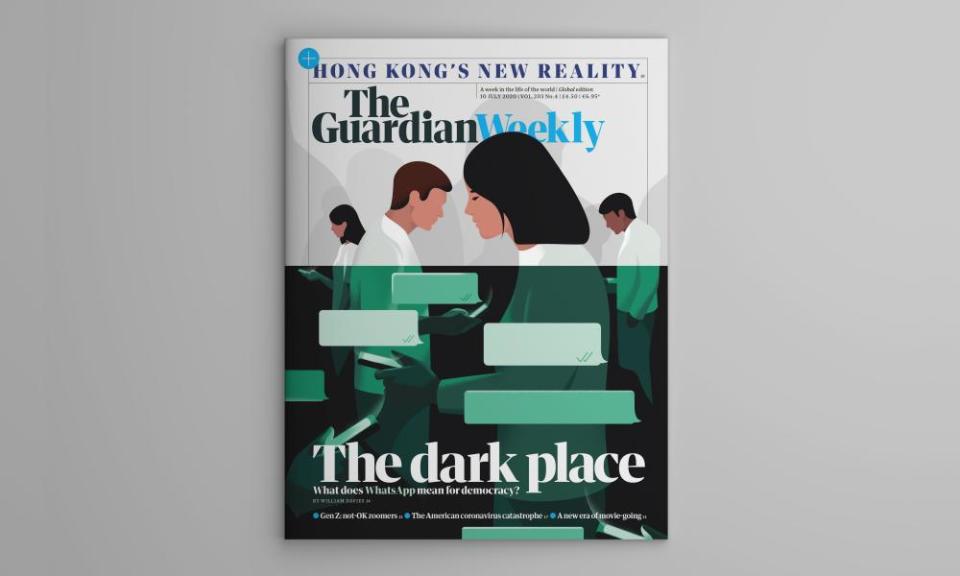What does WhatsApp mean for democracy? Inside 10 July Guardian Weekly

This week’s Guardian Weekly cover story is an essay by William Davies on the impact of WhatsApp on democracy and society around the world. Davies explores the role that vast networks of secret groups have on how we communicate and how the impact plays out both inside politics – from cabals using it to plot and manoeuvre – and outside, with the spread of rumour and conspiracy theories.
Before that, we head to Hong Kong where the arrests began almost as soon as a new national security law was imposed by Beijing last week. After more than a year of serious protest, China has clamped down, leaving leading names in the pro-democracy movement the choice to quit the city or risk more punishment. The new law has global implications too. The UK is facing China’s wrath by offering citizenship to more than 3 million Hongkongers with UK passports; and nations around the world are fearful of challenging the eastern superpower. In this week’s big story, Helen Davidson reports on how journalists and lawyers are having to rethink their role in a newly silenced city. We also hear from Guardian readers in or from Hong Kong on the implications of the new law for their lives, and Emma Graham-Harrison interviews one of the leading figures of the pro-democracy movement, Nathan Law, about why he has already felt the need to leave.
While the US president was busy posturing in front of Mount Rushmore and insulting Nascar drivers, the United States endured one of the worst weeks yet of the coronavirus crisis. The American death toll is now more than 130,000 and the growing number of infections leaves millions of citizens in danger – not to mention Trump’s electoral prospects in November.
The economic consequences for a new generation are terrifying, too, as Guardian US reporter Lauren Aratani found when she spoke to five impressive members of Generation Z about their fears for the future. After that, Ed Pilkington and Oliver Milman interview some of the US’s leading public health experts about the state of the pandemic in their country and what measures could be taken at this point to stem the tide of new infections.
If the US remains the worst-hit nation, Latin America is the region trapped in the eye of the Covid-19 storm. Brazil’s death toll has surged to more than 60,000 under the less-than-watchful eye of Jair Bolsonaro, but other South American nations, including Peru and Chile, have also been extremely badly hit. Further north, Mexico is quickly catching up to the grim death tolls of Italy and the United Kingdom. There are small signs of hope in Uruguay, which has done extremely well to contain the virus, but the overall situation, reports our Latin America correspondent Tom Phillips, is bleak. Alongside the obvious health impacts, a huge economic contraction will negatively affect education, equality and healthcare in the region; not to mention helping to fuel social unrest and violence, already at extremely high levels in countries such as Brazil.
In our opinion pages, we feature George Monbiot on the sinister political methods of Donald Trump and Boris Johnson, and Marina Hyde considers the arrest of Ghislaine Maxwell and what it means for Prince Andrew. In culture, as cinemas in England reopen, Steve Rose considers the future of a trip to the movies in a coronavirus world, and we review a stunning new graphic novel from Joe Sacco set in the north of Canada.
Get the Guardian Weekly delivered to your home by clicking here

 Yahoo News
Yahoo News 